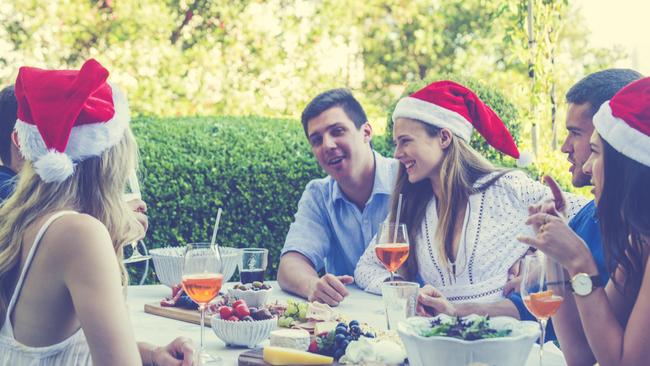Holiday season: how to eat well without gaining weight
Don’t want to ring in 2018 with extra kilos? How to navigate holiday buffets and big meals without a food coma.

At this time of year, many revellers overdo it at the holiday table, unwilling to forgo the turkey or ham with side dishes that mark the season. While many serve their Christmas meal in the afternoon, at 3pm to 4pm, a giant food-fest at that time of day may not be optimal. Lauri Wright, the director of the doctorate in clinical nutrition program at the University of North Florida’s Brooks College of Health, dishes on midday dining and why a healthy breakfast may be the key to indulging in a big meal without guilt.
Starving to eat
Dietitians have long surmised that it’s not when you eat but how much you eat, Wright says. But new research has shown that the way a body digests and hoards calories is more complicated than that.
“There is growing evidence that you should front-load your calories and eat your bigger meal earlier in the day,” says the spokeswoman for the Academy of Nutrition and Dietetics. That’s partly because when anticipating a big meal, most people tend to “save” kilojoules by skipping meals, usually breakfast. “But when you do that, you get over-hungry. Then you tend to overdo it at the next meal, ingesting as many as 30 per cent more calories than you’d typically eat at any other meal,” Wright says.
The most important meal of the day
Wright says breakfast may be the most important meal of the day but early morning isn’t a realistic time for a big feast. “It wouldn’t be any fun for the person waking up to make the turkey,” she says. Instead, she suggests eating a breakfast “that marries proteins with high-fibre carbohydrates, like eggs and whole-wheat toast”, to keep your blood sugar and energy steady throughout the day “and keep you satisfied so you aren’t over-hungry when the big meal arrives”.
Ideally, a huge meal would be served about 1pm. “If you had a filling breakfast and you have a big lunch, that’s fairly early in the day, you won’t be overly hungry and overeat as much,” Wright says. The timing gives heavy eaters some afternoon hours to be physically active rather than vegging out on the sofa.
“Being active after a big meal burns calories and also moves along peristalsis, so it works in two ways: using up the energy and encouraging digestion,” Wright says. In the evening, when you get hungry again, “you can still have that turkey sandwich, and you’re breaking the pattern of getting overly hungry and overeating”.
Eat thoughtfully
Because the kilojoules we ingest reset in a 24-hour cycle, there’s no reason to beat yourself up for overindulging one day, Wright says. “By the next day, the food has been digested and metabolised. So don’t go thinking you’ve already blown your waistline with this one meal and let it rip through the holidays, or you’ll wind up two kilos heavier by New Year.”
She suggests starting fresh the day after a huge meal by eating at consistent times, every four hours or so. Try to avoid late-night eating, even if weight gain isn’t a concern. “If you can keep your blood-sugar level up during the day, you’ll feel energised and avoid those crashing lows,” she says.
Wright has strategies for making the most of a feast, guilt-free. One is to use a salad plate instead of a dinner plate, “which encourages smaller portions”, she says. Another is to choose only special foods from a big buffet. “You might not like cranberry sauce much, but there it is, so you’ll take some. Don’t waste your calories on foods you don’t enjoy.”
Sipping lots of water, especially with bubbles, throughout a big meal will help fill you up. “But watch what you’re drinking,” she says. “Alcohol has lots of hidden calories.”
And skip the starters. “A lot of time you’re grazing through those without realising how much artichoke dip you’re consuming, and then you’re kind of full when the really good stuff is served.”
Lastly, she says, take your time. “It takes about 20 minutes for the brain to get the message that we’re full,” Wright says. “So slow down.” If you’ve skipped breakfast, you’ll tend to consume your big meal fast and well beyond the kilojoules you need to fill up, leading to discomfort.
Instead, “turn off your phone, have a good conversation with family and friends, sip your water and enjoy the experience as well as the food. That will also give your body time to register that you’ve had enough,” Wright says.



To join the conversation, please log in. Don't have an account? Register
Join the conversation, you are commenting as Logout